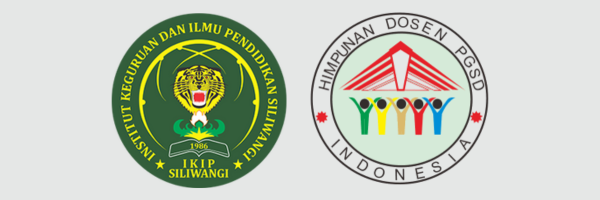EXPLORING SELF-REFLECTION PRACTICE AS A MEANS TO SELF-DEVELOPMENT FOR STUDENT TEACHER OF ELEMENTARY SCHOOL EDUCATION STUDY PROGRAM
DOI:
https://doi.org/10.22460/pej.v5i1.2255Abstract
This study aimed to investigate the self-reflection practice of prospective teacher of elementary education for their sense of self-development. This study will be guided by qualitative descriptive approach with phenomenology hermeneutics to investigate prospective teacher’s feeling in their written text. Accordingly the text would be analyzed using rhetorical analysis. The data of this study were collected from six written self-reflection that has correct composition as reflection from six prospective teacher that has taken implementation of thematic based learning class. The data of this study were analyzed based on its rhetorical expression with the consideration of the three stages of reflection process. The result of this study revealed that written self-reflections of prospective teacher mostly follow the same flow of reflection and has the sense of self-development in terms of their new perspective on the matter under consideration. Their new persepective usually in terms of conclusion or self-encouragement on the matter under consideration. The implication of this study was Result of this study may encourage the practice of reflection or self-reflection for prospective teacher so that it can be practiced and implemented more to the prospective teacher for their own personal and professional development.
References
Atkins, S., & Murphy, K. (1993). Reflection: a review of the literature. Journal of Advanced Nursing, 18(8), 1188–1192. https://doi.org/10.1046/j.1365-2648.1993.18081188.x
Bautista, A., & Oretga-Ruiz, R. (2015). Teacher Professional Development: International Perspectives and Approaches. Psychology, Society, & Education, 7(3), 240–251. https://doi.org/10.25115/psye.v7i3.1020
Boud, D., Keogh, R., & Walker, D. (Reds). (1985). Reflection: Turning Experience into Learning. RoutladgeFalmer Taylor and Francis Group. books.google.co.id/books?id=XuBEAQAAQBAJ&printsec=frontcover&dq=Promoting+reflection+in+learning:+a+model&hl
Boyd, E. M., & Fales, A. W. (1983). Reflective learning: Key to Learning from Experience. Journal of Humanistic Psychology, 23(2), 99–117. https://doi.org/10.1177/0022167883232011
Bubnys, R. (2019). A journey of self-reflection in students’ perception of practice and roles in the profession. Sustainability (Switzerland), 11(194), 1–17. https://doi.org/10.3390/su11010194
Christie, D., & Kirkwood, M. (2006). The new standards framework for Scottish teachers: facilitating or constraining reflective practice? Reflective Practice, 7(2), 265–276. https://doi.org/10.1080/14623940600688720
Çimer, A., Çimer, S. O., & Vekli, G. S. (2013). How does Reflection Help Teachers to Become Effective Teachers? International J. Educational Research, 1(4), 133–149. https://www.academia.edu/10783045/How_does_Reflection_Help_Teachers_to_Become_Effective_Teachers
Finlay, L. (2008). Reflecting on reflective practice. In Practice -based Professional Learning Center (Number January). http://ncsce.net/wp-content/uploads/2016/10/Finlay-2008-Reflecting-on-reflective-practice-PBPL-paper-52.pdf
Frick, L., Carl, A., & Beets, P. (2010). Reflection as learning about the self in context: Mentoring as catalyst for reflective development in pre-service teachers. South African Journal of Education, 30(3), 421–437. https://doi.org/10.15700/saje.v30n3a363
Hobbs, V. (2007). Faking it or hating it: can reflective practice be forced? Reflective Practice, 8(3), 405–417. https://doi.org/10.1080/14623940701425063
Jay, J. K., & Johnson, K. L. (2002). Capturing complexity: A typology of reflective practice for teacher education. Teaching and Teacher Education, 18(1), 73–85. https://doi.org/10.1016/S0742-051X(01)00051-8
Kayapinar, U. (2016). A study on reflection in in-service teacher development: Introducing reflective practitioner development model. Kuram ve Uygulamada Egitim Bilimleri, 16(5), 1671–1691. https://doi.org/10.12738/estp.2016.5.0077
Kenyon, E. A. (2017). Lived experience and the ideologies of preservice social studies teachers. Teaching and Teacher Education, 61, 94–103. https://doi.org/10.1016/j.tate.2016.10.006
Kuswandono, P. (2012). Reflective Practices for Teacher Education. Language and Language Teaching Journal, 15(01), 149–162. https://doi.org/10.24071/llt.2012.150102
Lew, M. D. N., & Schmidt, H. G. (2011). Self-reflection and academic performance: Is there a relationship? Advances in Health Sciences Education, 16(4), 529–545. https://doi.org/10.1007/s10459-011-9298-z
Mathew, P., Mathew, P., & Peechattu, J. (2017). Reflective Practices: a Means To Teacher Development. Asia Pacific Journal of Contemporary Education and Communication Technology, ISSN(3), 2205–6181. https://apiar.org.au/wp-content/uploads/2017/02/13_APJCECT_Feb_BRR798_EDU-126-131.pdf
Peck, K. (2019). The Influence Of Student Self-Reflection On Academic Mindset Change [Hamline University]. In School of Education Student Capstone Thesis and Dissertation 4467. https://digitalcommons.hamline.edu/hse_all/4467
Philipsen, B., Tondeur, J., Pynoo, B., Vanslambrouck, S., & Zhu, C. (2019). Examining lived experiences in a professional development program for online teaching: A hermeneutic phenomenological approach. Australasian Journal of Educational Technology, 35(5), 46–59. https://doi.org/10.14742/ajet.4469
Samsudin, A., Kelana, J. B., & Muftianti, A. (2019). Utilization of Internet-Based Learning Media in Enhancing Science Literacy Capabilities of Pgsd Students. PrimaryEdu - Journal of Primary Education, 3(2), 91–96. https://doi.org/10.22460/pej.v3i2.1284
Veine, S., Anderson, M. K., Andersen, N. H., Espenes, T. C., Søyland, T. B., Wallin, P., & Reams, J. (2019). Reflection as a core student learning activity in higher education - Insights from nearly two decades of academic development. International Journal for Academic Development, 25(2), 147–161. https://doi.org/10.1080/1360144X.2019.1659797
Wardani, N. F. K., Sunardi, & Suharno. (2019). Thematic Learning in Elementary School: Problems and Possibilities. Advances in Social Science, Education, and Humanities Research, 3rd International Conference on Learning Inovation and Quality Education (ICLIQE), 397(Icliqe 2019), 791–800. https://doi.org/10.2991/assehr.k.200129.099
Williams, J. D. (2015). Why Kids Need to Be Bored: A Case Study of Self-Reflection and Academic Performance. RMLE Online, 29(5), 1–17. https://doi.org/10.1080/19404476.2006.11462028
Xhaferi, B., & Xhaferi, G. (2017). Enhancing Learning Through Reflection– A Case Study of SEEU. SEEU Review, 12(1), 53–68. https://doi.org/10.1515/seeur-2017-0004
Zahid, M., & Khanam, A. (2019). Effect of reflective teaching practices on the performance of prospective teachers. Turkish Online Journal of Educational Technology - TOJET, 18(1), 32–43. https://eric.ed.gov/?id=EJ1201647#:~:text












